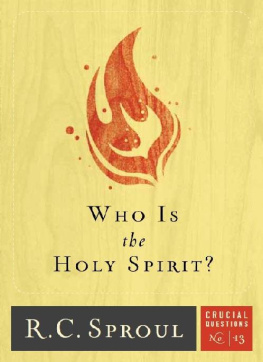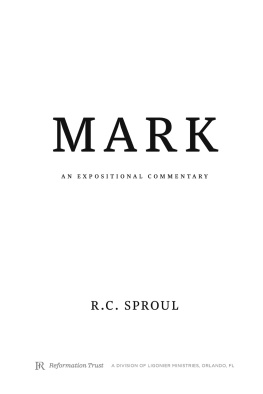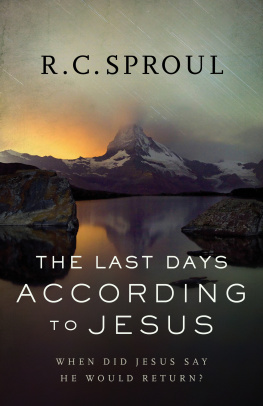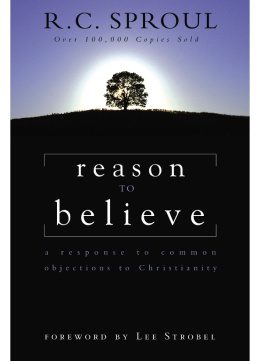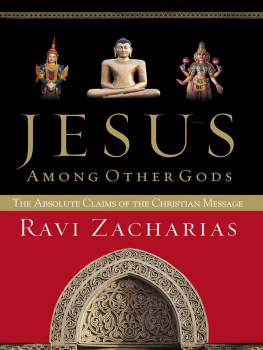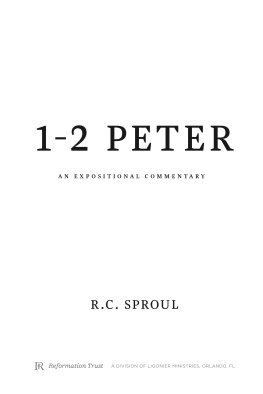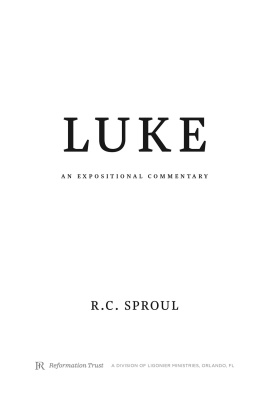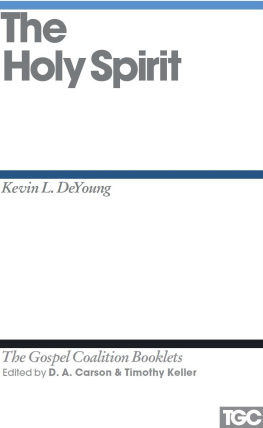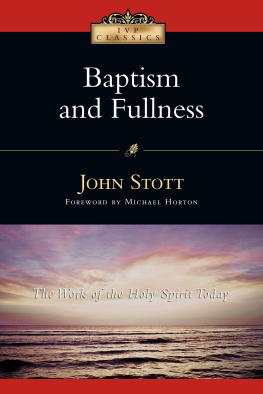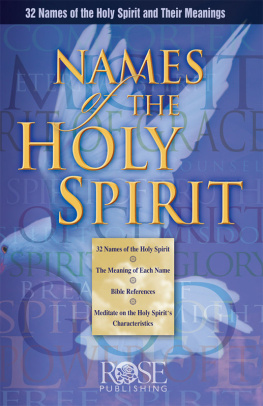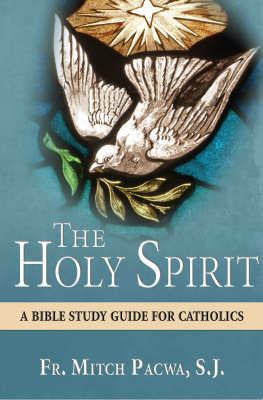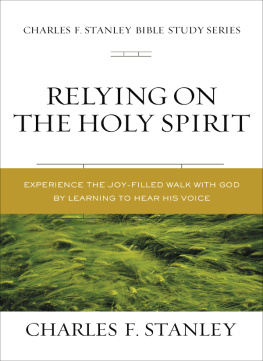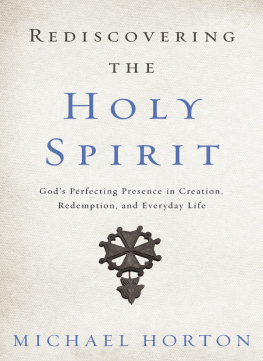
The Crucial Questions Series
By R. C. Sproul
Who Is Jesus?
Can I Trust the Bible?
Does Prayer Change Things?
Can I Know Gods Will?
How Should I Live in This World?
What Does It Mean to Be Born Again?
Can I Be Sure Im Saved?
What Is Faith?
What Can I Do with My Guilt?
What Is the Trinity?
What Is Baptism?
Can I Have Joy in My Life?
Who Is the Holy Spirit?
Does God Control Everything?

Who Is the Holy Spirit?
2012 by R.C. Sproul
Published by Reformation Trust Publishing
a division of Ligonier Ministries
421 Ligonier Court, Sanford, FL 32771
Ligonier.org ReformationTrust.com
Printed in North Mankato, MN
Corporate Graphics
November 2012
First edition
All rights reserved. No part of this publication may be reproduced, stored ina retrieval system, or transmitted in any form or by any meanselectronic,mechanical, photocopy, recording, or otherwisewithout the prior writtenpermission of the publisher, Reformation Trust Publishing. The only exceptionis brief quotations in published reviews.
Cover design: Gearbox Studios
Interior design and typeset: Katherine Lloyd, The DESK
Ebook conversion: Fowler Digital Services
Formatted by: Ray Fowler
Unless otherwise indicated, all Scripture quotations are fromThe Holy Bible, EnglishStandard Version, copyright 2001 by Crossway Bibles, a publishing ministry of Good News Publishers.Used by permission. All rights reserved.
Library of Congress Cataloging-in-Publication Data
Sproul, R. C. (Robert Charles), 1939
Who is the Holy Spirit? / R.C. Sproul.
p. cm. -- (The crucial questions series; no. 13)
ISBN 978-1-56769-299-0
1. Holy Spirit. I. Title.
BT121.3.S67 2012
231'.3--dc23
2012027502
CONTENTS

W hen I became a Christian in September of 1957, Ifound myself in a serious quandary. I was engaged tobe married, but when I told my fiance about my conversion, she thought I had lost my mind. That was upsettingenough, but I was also learning that I should not marry anonbeliever, and so I began to wonder whether I would beable to marry the woman I loved. Several months passedwith no resolution of this dilemma.
Finally, spring break approached. My fiance was planning to go home to Pittsburgh from the college where shewas studying, and I persuaded her to stop at my college,attend a campus Bible study with me, and then spendthe night in the girls dorm. I cannot remember anythingfor which I spent more time praying. I spent virtually thewhole day before she arrived on my knees, praying thatGod would work in her life. I came to the conclusion thatif she did not soon become a Christian, I would have tobreak the engagement, as much as I did not want to do so.
We went to the Bible study that night and she satthrough the whole thing without saying a word. Afterward,I took her to the girls dorm, and she was still very quiet.However, the next morning, when I went to meet her, shecame out as if she were walking on air. She told me thatshe had had a hard time sleeping because something hadhappened to her the night before. She kept waking up inthe night, pinching herself, and asking, Do I still have it?Each time she told herself, Yes, I still have it, and wentback to sleep. She had been converted to Christ throughthe study of the Scriptures the night before.
One of my clearest memories of that wonderful morning is of the moment when we were getting into my car.As she was telling me about her experience, she lookedat me with great excitement and said, Now I know whothe Holy Spirit is. Of course, she had attended churchfor years. She had heard the Holy Spirit mentioned. Shehad heard the benediction pronounced in the name of theFather, the Son, and the Holy Spirit. But now, for the firsttime, she had a sense of who the Spirit really is.
That statement of my fiance, who is now my wife, wasvery significant. Notice that she said, Now I know whothe Holy Spirit is, not, Now I know what the Holy Spiritis. In her conversion, she made a transition from understanding Christianity in an abstract sense to understandingit as a personal relationship with God. And one of the firsttruths she grasped was that the Holy Spirit is a person, nota thing.
It is exceedingly important that Christians know whothe Holy Spirit is and understand something of the vitalrole He plays in their lives. That is why I have written thisbooklet. Of course, the biblical teaching on the Holy Spiritis far too extensive to be covered adequately in a volume ofthis size. My purpose in this booklet is to simply providethe most basic of answers to the question of who the Spiritis and then to touch briefly on some of the important rolesHe plays in the lives of believers. For a fuller treatment, Iencourage you to see my book The Mystery of the Holy Spirit.
I pray this short treatise on the Spirit will draw youinto a deeper relationship with the God you love and serve,Father, Son, and Holy Spirit.

A s Christians, we embrace a historic formula aboutGods being. We say, God is One in essence and threein person. In other words, God is triune; He is a Trinity.This means there are three persons within the Godhead.These persons are understood in theology as distinct characters. The differences among the three, the Father, Son,and Holy Spirit, are real differences but not essential differences. In other words, there is only one essence to theGodhead, not three. In our experience as human beings,each person we meet is a separate being. One person meansone being, and vice versa. But in the Godhead, there is onebeing with three persons. We must maintain this distinction lest we slip into a form of polytheism, seeing the threepersons of the Godhead as three beings who are three separate gods.
None of us can plumb the depths of the Trinity comprehensively, but we can take some small steps tounderstand it better. The words existence and subsistencecan help us here.
EXISTENCE AND SUBSISTENCE
One of the games I used to play with my seminary students was to ask them, Does God exist? They would say,Of course God exists. I would then say, No, God doesnot exist, and it was always fun to see the looks of horrorthat would appear on their faces as they began to wonderwhether their professor had abandoned Christianity andgiven up his faith. But I quickly had mercy on them andexplained that I was playing a little philosophy game byasserting that God does not exist.
The wordexist comes from the Latin existare, whichmeans to stand out of. So the word exist literally meansto stand out. That does not necessarily mean that if youexist you are outstanding at what you do. The obviousquestion is, of what does an existing being stand out?
The idea of existence has its roots in ancient philosophy, when the philosophers were very concerned with thequestion of being. We also are concerned with this question; in fact, when we make a distinction between Godand ourselves, we identify Him as the Supreme Being andourselves as human beings. However, that distinction is abit misleading. Both descriptions use the word
Next page
